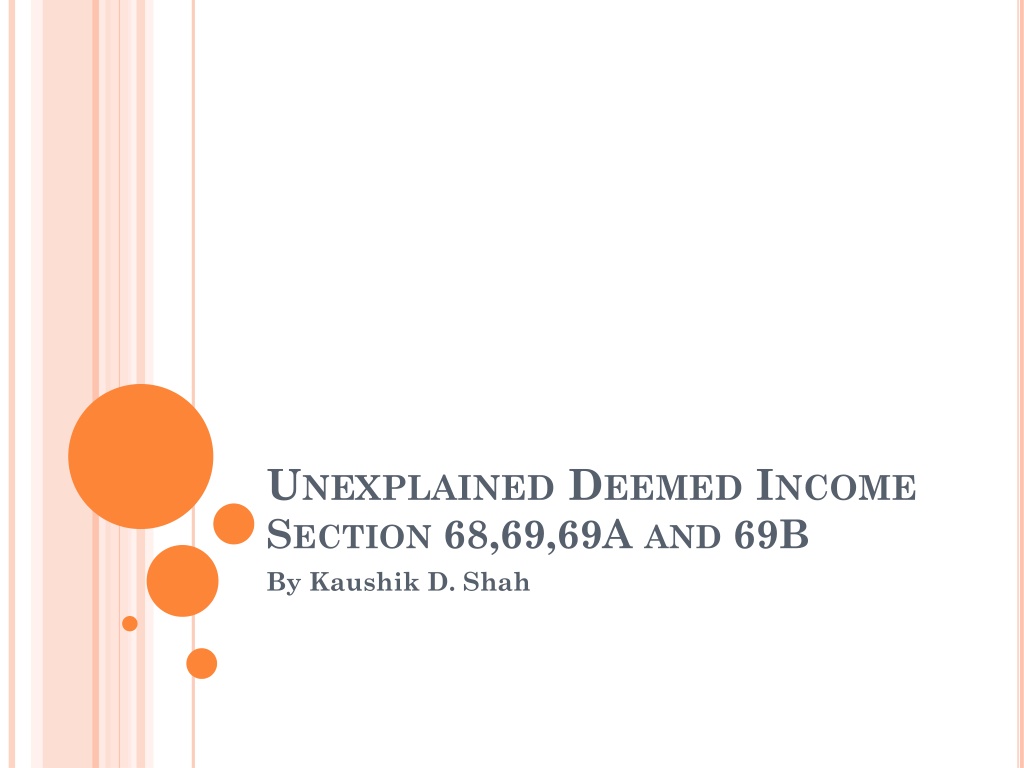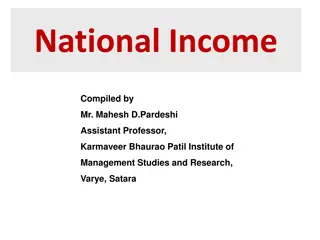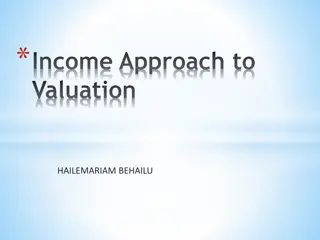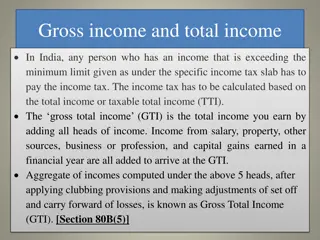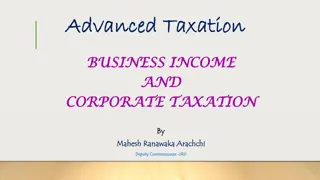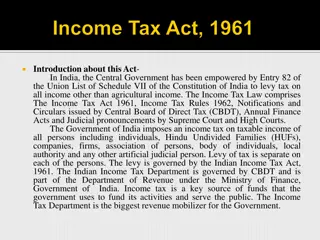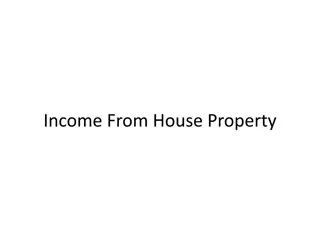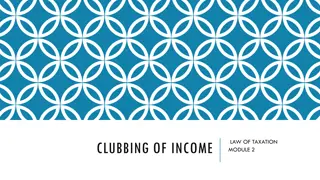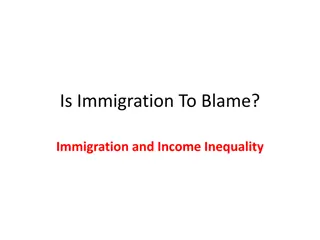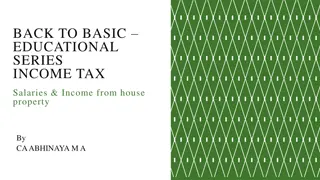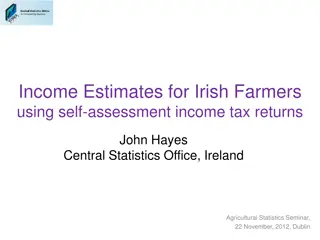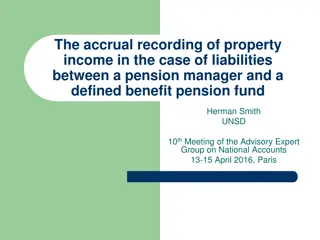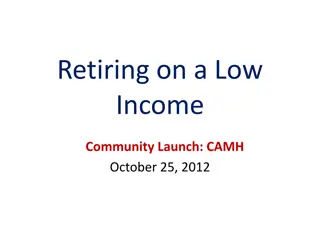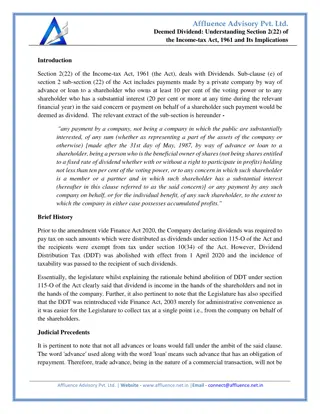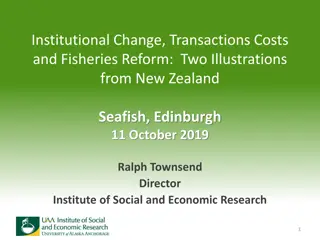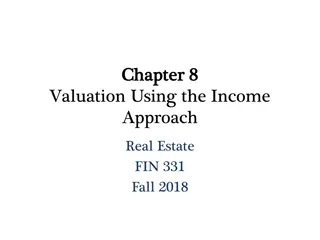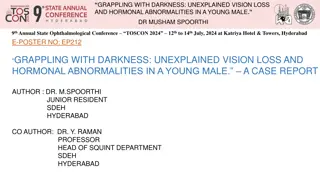Understanding Unexplained Deemed Income Sections 68, 69, 69A, and 69B
Explore the provisions of sections 68, 69, 69A, and 69B relating to unexplained income, cash credits, investments, and undisclosed amounts in books. Learn about the treatment of sums credited without explanation and recent legal rulings related to share application money. Relevant Supreme Court and High Court cases are discussed, shedding light on the complexities surrounding undisclosed income.
Download Presentation

Please find below an Image/Link to download the presentation.
The content on the website is provided AS IS for your information and personal use only. It may not be sold, licensed, or shared on other websites without obtaining consent from the author. Download presentation by click this link. If you encounter any issues during the download, it is possible that the publisher has removed the file from their server.
E N D
Presentation Transcript
UNEXPLAINED DEEMED INCOME SECTION 68,69,69A AND 69B By Kaushik D. Shah
TOPICS COVERED Section 68- Cash Credits Section 69- Unexplained Investments Section 69A-Unexplained money and artistic collections etc. Section 69B- Amount of investments etc. not fully disclosed in Books.
SECTION 68 Where any sum is found credited in the books of an assessee maintained for any previous year, and the assessee offers no explanation about the nature and source thereof or the explanation offered by him is not, in the opinion of the Assessing Officer, satisfactory, the sum so credited may be charged to income- tax as the income of the assessee of that previous year.
SECTION 68- YEAR OF CHARGE If the sum is credited in the books of account in AY 2001-2002, the same cannot be taxed in any other assessment year other than AY 2001- 2002. Raj HC in 301 ITR 404 Delhi High Court in Usha Stud 301 ITR 384 carried forward cash credit balances can only be examined in the year in which they are firstly/freshly introduced
SECTION 68: SHARE APPLICATION MONEY SHARE CAPITAL AND SECTION 68: LATEST SC RULING IN LOVELY EXPORTS PVT LTD. 216 CTR 195 : Whether share application money can be treated as undisclosed income of the assessee? If the share application money is received from alleged bogus shareholders, whose names are given to AO, then department is free to proceed to reopen their individual asst. in accordance with law, but it cannot be regarded as undisclosed income of the assessee.
SC IN LOVELY EXPORTS APPLIED LASTLY IN: Delhi High Court Bhav Shakti Steels 18 DTR 194 ITAT Software Consultants ITA 2554/2004 Sumangal Commercial IT/SS/49/2005 Acquatech 119 TTJ 140 Anu Industries 19 DTR 465 Gongour Investments 18 DTR 242 Samir Bio Tech 17 DTR 224 Other: Value Capital 221 CTR 511 BHC in Creative World P&HHC in G.P.Intl
SC IN LOVELY EXPORTS Issue Whether SC ruling in Lovely Exports can be applied in context of unsecured loans taken by a corporate assessee? Whether SLP dismissal by speaking order in Lovely Exports attract binding force of Article 141? Possible view Seems to be Yes (more in case of corporate lenders) Yes Refer SC in 245 ITR 360
SECTION 68: DHC IN E TWO E (P) LTD ITA 167/2009 "In this appeal the ITAT has applied the decision of the Full Bench of the Court in CIT vs Sophia Finance Ltd; 205 ITR 98 and dismissed the appeal of the Revenue. It has been Observed that the identity of the share applicants had been fully established; and as had been observed by the Assessing Officer, The shares have been allotted in the subsequent years. No substantial question of law arises for consideration. Accordingly, the appeal is dismissed."
UNEXPLAINED INCOME SECTION 68 Post SC ruling in Lovely exports holding identity proof sufficient discharge of onus- ITAT benches New trends (ADVERSE) In case of High Premium/portion: Kushara Real Estate ITA 4247/Del/2009 In case of entry operator statement: Janki Jewellers ITA 3787/Del/2009 In case of denial by share holder: Beautux In case of non service of summons/non production of shareholders: Infomediary and Tirputai Venkateshwar Delhi Bench
SECTION 68:UNSECURED LOANS Assessee should prove identity, capacity of lenders as well as genuineness of transaction. Where lender is assessed to tax, assessee can avoid addition by filing confirmation with particulars of PAN. Case Laws: CIT Vs. Orissa Corporation (P) Ltd. (159 ITR 78) (SC) CIT Vs. Rohini Builders (256 ITR 360) (Guj.) Metachem 245 ITR 360 (MPHC) Nem Chand Kothari 264 ITR 254 (Gau) DHC in ITAC (ITA 1194/2007) and Rajokri Farms Pvt Ltd (ITA 1410/2008); Real Time Marketing 221 CTR 716; Diamond Products 177 Taxman 331 Raj HC in 219 CTR 571 & 220 CTR 622; P&HHC in 180 Taxman 185; Guj HC in 177 Taxman 35
o Assessee is not required to prove source of the source of credit. Case Laws: Hastimal V. CIT (49 ITR 273)(Mad.) Tolaram Daga V. CIT (59 ITR 632)(Assam) Nemichand Kothari v. CIT (264 ITR 254) (Gau) Murlidhar Lahorimal Vs. CIT(280 ITR 512) (Guj); KASTURBHAI MAYABHAI PVT. LTD ; Delhi - ITA 766,830,882/2009; Raj Kr Aggarwal- All HC etc. o In case of firm, once a partner having accepted that he advanced certain sum to the firm: No addition in hands of firm (investment can be examined in hands of partner as per section 69 etc): a) P&HHC in 208 CTR 459;224 ITR 180 b) Mad HC in Taj Browellers 291 ITR 232 c) SC in Lovely Exports (supra) d) All HC in 141 ITR 706; (- 272 ITR 136 first day partner s money credited in firm s books)
Mere Non production of lender/shareholder etc cannot by itself be a ground for making addition u/s 68 Held in a) Jodh ITAT in 100 TTJ 644 b) DHC in Divine Leasing etc 299 ITR 268 c) Cal HC in 168 ITR 493 d) Guj HC in Rohini Builders (supra) e) SC Orissa Corporation (supra) f) SC in Anis Ahmed 297 ITR 441 g) BHC in 90 ITR 396 h) Patna HC in 151 ITR 150 i) DHC in Rungta Irrigation.
While furnishing Confirmation for Unsecured loans etc: precautions (points to be covered in conformation) a) Date of Signing of confirmation b) Confirmation of fact of transaction of giving the amount by the creditor c) Mode of Payment i.e through DD/Cash/cheque d) In case of banking channel adopted, particulars of cheque etc e) In interest bearing: state this vital fact f) PAN and place of assessment of creditor g) If possible, source of lending the money
In case credit is introduced in books on first day of first previous year for the assessee and/or before commencement of the business, it is held in Cases of firms and companies, that no cash credit can be added under section 68 of the Act: a) Mad HC in Taj Browllers (supra) b) SC in Bharat Engg 83 ITR 187 c) Raj HC in Kewal Krishan dated 12/1/2009 d) Luck ITAT in 7 SOT 457 Surender.Prasad.Mishra e) Del ITAT in Sai Baba Rupadas ITA 1543/98 f) Del ITAT in Ghabiabad Footwear 142 Taxman 8 Magazine g) All ITAT in 14 SOT 190 Smt Meera Devi In case explanation offered by assessee is found Unacceptable, whether addition u/s 68 of the Act is Automatic (Held no by SC in P.K.Noorjahan 237 ITR 570) In view of word MAY used instead of shall (also applicable to section 69 eg: where an assessee cannot be supposed to have earned undisclosed income of alleged sum given the factual background (viz. a lady aged 17 years never engaged in business), no addition is possible in hands of said assessee) (also applicable to first year cash credit where assessee operated for few months in a year etc)- Applied by All ITAT in 14 SOT 190.
Connotation of Word Books as used in section 68 of the Act: Held Pass Book/Bank Statement is not books : in BHC in Bhai Chand Gandhi 141 ITR 67; Ms Mayawati 113 TTJ 178; Jawaharlal 71 ITD 324 P&HHC in 171 ITR 532 Connotation of phrase Found to be credited as used in section 68: Incumbent on AO to give finding by reference to books that alleged credit is found credited in books (Refer SC in Hind Lamps). In case of sale of jewellery declared under VDIS, capital gains thereon albeit can be examined u/s 68 of the Act, however no addition for the same can be Made, in case assessee has furnished: Conformation from jewellery purchaser Bank a/c copy for transaction proof Sale/Purchase Voucher of Jewellery etc. (Refer Special Bench of ITAT in Manoj Aggarwal (supra); BHC in Inder V Nankani www.itatonline.orgetc); Mad HC in 163 Taxman 682 1. 2. 3.
SECTION 68: AMOUNT RECD THROUGH WILL Delhi ITAT in Budh Kishore 87 TTJ 140: Amount recd through Will cannot be taxed by rejecting the will on conjectures and surmises (that is will is not on stamp paper, there are no witnesses; it merely bears thumb impression etc) Also similar conclusion by Jodhpur ITAT in 102 TTJ 161
SECTION 68 & SECTION 41(1) Unclaimed liabilities remaining outstanding for no. of years- whether can be brought to tax u/s 41(1) and section 68 ?: Refer: Latest Ahd ITAT in Govindbhai Patel ITA 1675/2009-30/10/2009 (for non expense item) Latest P&H HC in Sita Devi Juneja and G.P.Intl (Nov/Dec 2009) iii. Latest Delhi ITAT in Motia Rani Bhatia (B Bench) i. ii.
PREVIOUS WITHDRAWALS AND CASH DEPOSIT Latest Mumbai Bench of ITAT RULING IN 34 SOT 281 Raj Dadarkar Latest Delhi Bench of ITAT ruling in Sanjiv Chadha etc
SECTION 68: AMOUNT RECD THROUGH GIFT Bang ITAT in T Krishnamurthy ITA 262/2008 Where assessee explained source of funds as cash gift from his mother, which assessee stated his mother accumulated from agricultural savings- was Held rightly rejected by AO; CIT-A & ITAT on the Ground of human probabilities/surrounding Circumstances (that is Keeping cash in remote village is against human probability and before rejecting mother s confirmation, it is not sine qua non that she must be examined and AO on basis of human conduct reject assessee s version)
SECTION 69 Where in the financial year immediately preceding the assessment year the assessee has made investments which are not recorded in the books of account, if any, maintained by him for any source of income, and the assessee offers no explanation about the nature and source of the investments or the explanation offered by him is not, in the opinion of the Assessing Officer, satisfactory, the value of the investments may be deemed to be the income of the assessee of such financial year.
RELEVANT CITATIONS ON SECTION 69 In Mad HC in 241 ITR 363,158 Taxman 363, 236 ITR 340, J&K HC in 201 CTR 178, it was held that when there was inflated stock to avail higher credit facility from bank (only amount inflated but quantity remained same), the books of the Assessee were duly audited and no trading outside the books were detected, the addition of difference in stock value could not be made as undisclosed income In Delhi ITAT Kanta Dua, a husband made investment in Units of Mutual fund from Joint Bank Account in the name of himself and wife (second holder), the AO based on AIR information, made assessment in the hands of wife as unexplained investment, which was held as invalid by higher Tax authorities.
In Mad HC in N Swamy 241 ITR 363 relied by Chennai ITAT in Omega Estates and Chd ITAT in Dr. R.L.Narang, it was held that The burden of showing that the assessee had undisclosed income is on the revenue. That burden cannot be said to be discharged by merely referring to the statement given by the assessee to a third party in connection with a transaction which was not directly related to the assessment and making that the sole foundation for a finding that the assessee had deliberately suppressed his income. In Mum ITAT in Rupee Finance 119 TTJ 643, it was held that merely because assessee purchased certain shares at value much less than market price, difference in purchase cost and market price cannot be added u/s 69.
In ITO vs. Mrs. Deepali Sehgal (ITAT Delhi), ITA No. 5660/Del/2012, the AO noted that assessee had withdrawn huge cash from bank account and the same amount had been deposited to the same account after lapse of substantial time. The AO rejected the explanation and held that the assessee hadcash deposit of Rs.24,38,000/- as unexplained money and the assessee found to be the owner of the money as he had not offered any acceptable and cogent explanation. AO, in his remand report could not bring out any fact that the cash withdrawn from Saving Bank Account and partnership overdraft account was used for other purpose anywhere else then, merely because there was a time gap between withdrawal of cash and its further deposit to the bank account, the amount cannot be treated as income from undisclosed sources u/s 69 of the Act in the hands of the assessee. Hence, the addition made by AO without any legal and justified reason was rightly deleted by the CIT (A).
SECTION 69A Where in any financial year the assessee is found to be the owner of any money, bullion, jewelry or other valuable article and such money, bullion, jewelry or valuable article is not recorded in the books of account, if any, maintained by him for any source of income, and the assessee offers no explanation about the nature and source of acquisition of the money, bullion, jewelry or other valuable article, or the explanation offered by him is not, in the opinion of the Assessing Officer, satisfactory, the money and the value of the bullion, jewelry or other valuable article may be deemed to be the income of the assessee for such financial year.
RELEVANT CITATIONS ON SECTION 69A In P&HHC in 294 ITR 78, the assessee was found to be in possession of loose slips and not any valuable article or things. Neither the possession nor the ownership of any jewelry mentioned in the slips was proved. Therefore, the Tribunal had rightly held that the provisions of section 69A of the Act were not applicable. The Tribunal also held that if the assessee failed to explain the contents of the slips, it was for the Revenue to prove on the basis of material on record that they represented transactions of sales or stock in trade before making any addition on this score. The assessee had duly explained that these were rough calculations and the assessee s explanation had not been rebutted by any material evidence. Commissioner of Income-tax vs. Meghjibhai Popatbhai Virani Where assessee in support of certain amount received from his family members on account of sale of property, produced family settlement agreement and sale agreement, there being no defect in said agreements, amount so received by assessee could not be added to his taxable income as unexplained money.
Ownership is one of the Considerations The material difference between Section 68 and 69A is that Section 68 does not require that the amount is to be owned by the Assessee. It only deals with any amount shown in the books of accounts of the assessee whereas Section 69A deals with money, etc., owned by the assessee and found in his possession. Durga Kamal Rice Mills v. CIT [2003] 130 Taxman 553 (Cal.). Possession of cash is evidence of ownership Where cash was found in possession of assessee- politician during search and his claim that it belonged to a political party was denied by President and Treasurer of said party, addition of such cash to assessee s income was rightly sustained by tribunal Sukh Ram v. Asstt. CIT [2006] 285 ITR 256 (Delhi).
Date of possession of money, etc. will determine year of Assessment The relevant would be the date on which the assessee is physically found to be in possession of the money, etc. and not the date on which the finding about ownership is recorded. Patoa Bros. v. CIT [1982] 133 ITR 672 (Gau.). Where assessee was managing a firm which collected deposits from public, but there was no evidence regarding registration and genuineness of firm and assessee could not explain source of deposits, nor could assessee establish that such deposits did not belong to him, addition of such deposits as asseesee s unexplained investments was justified CIT v. K. Chinnathamban [2007] 162 Taxman 459/292 ITR 682 (SC).
SECTION 69B Where in any financial year the assessee has made investments or is found to be the owner of any bullion, jewelry or other valuable article, and the Assessing Officer finds that the amount expended on making such investments or in acquiring such bullion, jewelry or other valuable article exceeds the amount recorded in this behalf in the books of account maintained by the assessee for any source of income, and the assessee offers no explanation about such excess amount or the explanation offered by him is not, in the opinion of the Assessing Officer, satisfactory, the excess amount may be deemed to be the income of the assessee for such financial year.
RELEVANT CITATIONS ON SECTION 69B In Smt. Amar Kumari Surana v. CIT [1996] 89 Taxman 544 (Raj.), it was held that the burden is on the revenue to prove that real investment exceeded the investment shown in account books of the assessee. Merely on the basis of fair market value no addition can be made under section 69B, but if on the basis of sufficient material on record some reasonable inference can be drawn that the assessee has invested more amount in purchase of plot than that shown in account books, then only the addition under section 69B can be made.
In In CIT v. Daya Chand Jain Vaidya, the Allahabad Court shifted the onus on to the department saying that if the assessee s explanation that the investments were in fact held by his wife and sons is not sustainable, then the department has to prove with material evidences that the investments were owned only by the assessee himself. Having said this, it is noteworthy that sec.69B per se uses the phrases like is found to be the owner of any bullion, jewelry or other valuable article, and the Assessing Officer finds that the amount expended on making such investments or in acquiring such bullion, jewelry or other valuable article (as opposed to the word reasons to believe ) which is very conclusive that there is no room for any taxation based on a mere suspicion.
In case of doubt, Assessing Officer can make reference to Valuation Cell If the assessee maintained books of accounts in the regular course of business and necessary entries relating to the expenditure towards cost of construction are entered in the books of accounts, which are open to verification, and its correctness is not doubted, it should be accepted. In case of doubt, Assessing Authority can refer the matter to the valuation cell for determination of cost of construction and rely upon such report as an evidence, but it is open to the assessee to challenge the correctness of such valuation report and in case if it establishes that such report is not correct and reliable, expenditure shown in the construction as per the books of accounts is liable to be accepted. CIT v. Meerut Cement Co. Pvt. Ltd. [2006] 15-0 Taxman 7 (All.)
